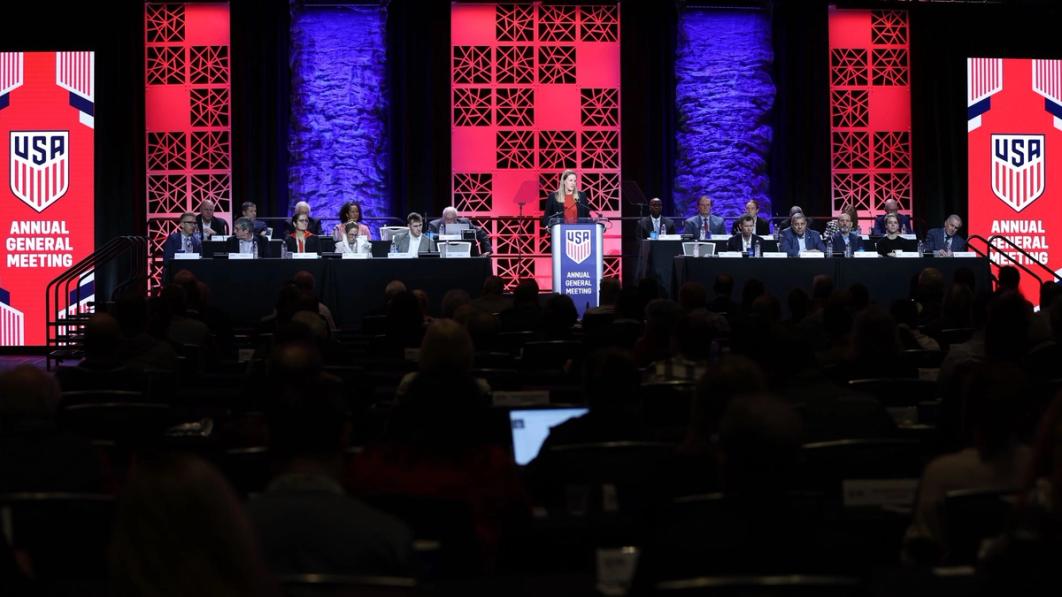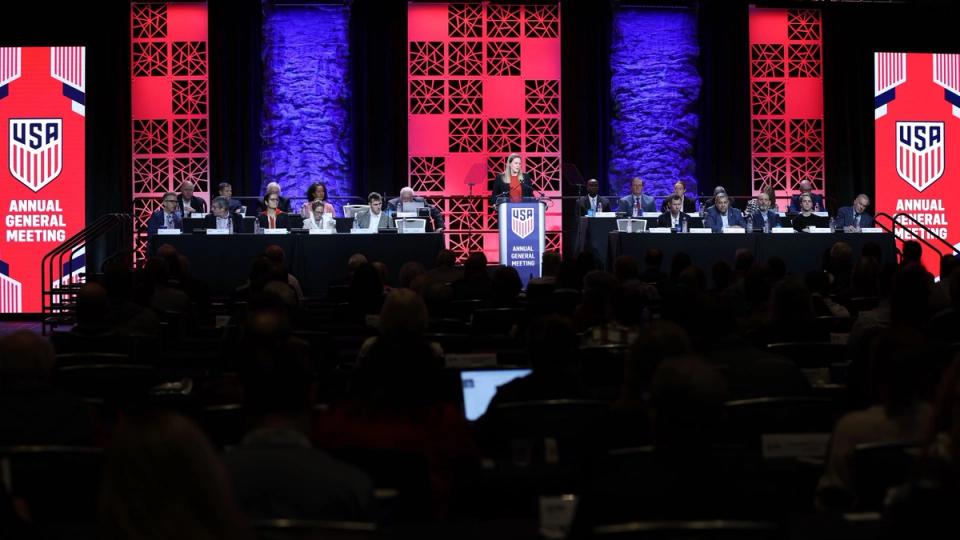DALLAS (February 10, 2024) – The U.S. Soccer Membership approved a range of proposals during today’s National Council Meeting at the 2024 U.S. Soccer Annual General Meeting (AGM).
Throughout the AGM, which was held from February 8 -10 at the Hilton Anatole in Dallas, U.S. Soccer President Cindy Parlow Cone and CEO JT Batson emphasized working more closely with membership, especially in relation to the Federation’s strategic pillars: grow the game, foster the best playing environments, develop winning teams, grow the soccer economy to fuel reinvestment and create a world-class organization.
Throughout the weekend, there was also a focus on the accelerated initiatives that are driving immediate impact against the strategic pillars. These priorities include: World Cup 2026 legacy, the Safe Soccer clearance program, growing the number of referees, democratizing soccer knowledge, a unified sporting strategy, ecosystem partnerships and the development of the National Training Center.
“The collaboration with our members over the last few days has been so important,” said U.S. Soccer CEO JT Batson. “Success for U.S. Soccer requires a collective effort and with our members I know we can do big things. Our goal is to make soccer the #1 sport for the next generation — the most played, the most accessible and the most followed. The only way we can do this is through the hard work and support of our membership.”
“Our members are the heartbeat that keeps soccer alive in communities across the country,” said U.S. Soccer President Cindy Parlow Cone. “I enjoyed meeting with them at AGM this year, hearing about the great work they are doing and how U.S. Soccer can help them achieve their goals. We have ambitious goals, and with our members, together we are going to transform our game. I have never been more confident about the future of U.S. Soccer.”
The weekend was focused on the opportunity to drive the unprecedented growth of soccer in the U.S., highlighting the upcoming 2026 FIFA Men’s World Cup, the bid for the FIFA Women’s World Cup in 2027, the announcement of the new National Training Center in Atlanta and the addition of seven new commercial partners.
SPECIAL OLYMPICS AND GIRLS’ ACADEMY JOIN MEMBERSHIP
Two new organizations joined the U.S. Soccer membership this weekend: Special Olympics of North America and the Girls’ Academy. Special Olympics of North America provides opportunities in sports for children and adults with intellectual disabilities, granting them a chance to develop physical fitness, demonstrate courage, experience joy and participate in a sharing of gifts, skills and friendship with their families, other Special Olympics athletes and the community. Special Olympics North America had over 36,000 participants in soccer activities last year, marking a potentially massive addition to the number of players in U.S. Soccer’s disabled service organizations.
The Girls’ Academy (GA) is a national girls’ soccer league that operates in more than 30 states and the organization aims to be a leading youth development platform for the best female soccer players in the United States, cultivating an environment that empowers each player to reach their best potential as an athlete and human being. GA players take an active role in shaping the league with the GA Advisory Panel – a group of more than 1,200 athletes that suggests ways to improve the league, organizes charitable initiatives, engages in sponsor opportunities and more. Founded in 2020, the league now includes more than 13,000 players at 94 member clubs across the country.
NATHÁN GOLDBERG CRENIER ELECTED VICE PRESIDENT OF U.S. SOCCER
During the National Council Meeting, Nathán Goldberg Crenier was elected Vice President by earning 75 percent of the vote from Membership. A simple majority was necessary for Goldberg Crenier to join the board for the next four years.
“We’re excited to welcome Nathán as U.S. Soccer’s Vice President,” said Cone. “His energy, passion and dedication to help grow the game combined with his background working across different areas of the sport will be a great asset to the Federation.”
BURTON HAIMES EARNS WERNER FRICKER BUILDER AWARD
After nearly 50 years of service to AYSO, Burton Haimes was named the Werner Fricker Builder Award winner, which is the highest honor that can be bestowed upon an individual by U.S. Soccer. A long-time member of the U.S. Soccer Board of Directors and a U.S. Soccer Life Member, he served on the AYSO Board of Directors for 30 years, including seven as President and 12 as Board Chairman. During his tenure, Haimes oversaw the development and growth of a nationwide, community-based youth soccer organization that has served millions of children and their families.
ESMERALDA NEGRON PRESENTED WITH THE KIM CRABBE GAME CHANGERS AWARD
Former U.S. Women’s Youth National Team/professional player Esmeralda Negron earned the second annual Kim Crabbe Game Changers Award for her establishment of ata football, a free digital platform which brings together premium live and curated women’s football content and connects it to fans and players across all levels of the game from broadcast distribution to direct engagement. The platform makes the women’s game accessible to fans around the world from the grassroots to the professional level.
Established by Game Changers United – U.S. Soccer’s external Advisory Council focused on advancing diversity, equity, inclusion and belonging (DEIB) across all areas of American soccer – the award is given to a member of the soccer community who has made a lasting impact in the areas of DEIB in a creative way while fostering long-term sustainability for the future of soccer. The award is named after Kim Crabbe, a pioneer in women’s soccer who became the first African American woman to play for the USWNT in 1986.
JOSLYNN BIGELOW NAMED CARLA OVERBECK LEADERSHIP AWARD RECIPIENT
Joslynn Bigelow won this year’s Carla Overbeck Leadership Award for her impactful work in the United States’ broad landscape of disability soccer with TOPSoccer- an adaptive soccer program for athletes with intellectual, developmental or physical disabilities. She serves as a TOPSoccer coach in her home state of Oregon, is the director for two local TOPSoccer programs and has been named the Oregon Youth Soccer Association (OYSA) TOPSoccer Coach of the Year. Bigelow also currently serves as OYSA TOPSoccer Chair plus is an assistant coach for CP Soccer and head coach of the Down Syndrome Sports of America Futsal National Team.
The award is named after former USWNT captain and National Soccer Hall of Famer Carla Overbeck. Overbeck led the 1996 Gold Medal Olympic Team and the 1999 World Cup Championship Team and has been lauded for her leadership by former teammates and coaches. She continues to lead with over 30 years of experience as a college coach at Duke University.
BOB KEPNER AND SAL RAPAGLIA ADDED AS LIFE MEMBERS
North Carolina soccer icon Bob Kepner and New York-based Italian-American soccer legend Sal Rapaglia were given Life Membership, the highest honor that the National Council can bestow upon an individual, honoring decades of dedicated service to the growth of the soccer in the United States.
After playing college soccer at the University of North Carolina at Chapel Hill, Kepner launched a lifetime of service to the game in the Tar Heel State. Working to build a foundation for soccer in the state, he founded the Central Carolina Youth Soccer Club in the 1970s, was president of the North Carolina Youth Soccer Association from 1986-2001 and president of the North Carolina Adult Soccer Association from 1994-2002 and 2010-2016. With the Federation, he served as Chairman of the Credentials Committee from 2010-2019.
Rapaglia immigrated to the U.S. at age 15 and then leapt into the American soccer landscape, playing for the famed Brooklyn Italians Soccer Club and then coaching several clubs in the Italian-American Soccer League, eventually becoming president of the organization. He has served as president of the Eastern New York State Soccer Association for 44 years and was awarded U.S. Soccer’s prestigious Werner Fricker Builder Award in 2006.
SOCCER ECOSYSTEM PANELS
New at this year’s AGM, a number of soccer leaders, both from the United States and across the continent, joined U.S. Soccer executives for special discussions on their areas of expertise in the soccer ecosystem, recapping a memorable year for the U.S. Soccer Federation and looking ahead at the incredible moments to come over the next few years.
- Coaching Trends: USMNT Assistant Coach BJ Callaghan, Beach WNT Head Coach Morgan Church, USWNT Interim Head Coach Twila Kilgore, CP MNT Assistant Coach Ross Moffat; Moderated by Chief Soccer Growth Officer Shari Summers
- Chief Soccer Growth Officer Shari Summers brought together a diverse group of leaders from across the U.S. National Team program to discuss what it’s like coaching at the highest international levels. While each discipline has its own nuance, the coaches shared best practices that transcend soccer throughout all of its forms.
- NWSL and Women’s Soccer: NWSL Commissioner Jessica Berman; Moderated by U.S. Soccer CEO JT Batson
- It’s been a remarkable period of growth for the National Women’s Soccer League as it prepares to kick off its 11th season. Two new teams - Bay FC and Utah Royals - will join the league this spring, with a 15th team on the way based in Boston. The success of professional leagues is key to the growth of the game in the United States and the NWSL plays a key role in developing winning teams as the country’s top-flight women’s league.
- Amateur Landscape: USA Deaf Soccer Association’s Suzanne Anderson, New Jersey Youth Soccer’s Evan Dabby, Tennessee State Soccer Association’s Hans Hobson and Oregon Adult Soccer Association’s Robin Runstein; Moderated by President Cindy Parlow Cone
- President Cindy Parlow Cone chatted with amateur soccer leaders from across the country about the importance of amateur soccer in growing the game and retaining participation nationwide. With the Federation’s goal to celebrate all forms of play and ensure lifelong connections to the sport, amateur soccer serves an essential role.
- Refereeing a World Cup Final: U.S. Soccer/FIFA Referees Kathryn Nesbit & Tori Penso; Moderated by CEO JT Batson
- The last 14 months have seen U.S. Soccer referees reach unprecedented heights. Penso became the first American to referee a senior World Cup Final at last summer’s Women’s World Cup in Australia/New Zealand. Nesbitt served as reserve assistant referee at the 2022 FIFA World Cup Final in Qatar and then ran the sidelines as assistant referee at the Final in Australia/New Zealand, becoming the first individual to officiate both a men’s and women’s senior World Cup Final. Villarreal was the support VAR for the 2023 WWC Final. As these referees have reached the highest levels of the sport, the Federation is striving to grow the number of referees in the United States.
- Representing the U.S. Internationally: Beach WNT’s Ali Hall, CP MNT’s Ben Lindau, Deaf WNT’s Kate Ward; Moderated by U.S. Soccer Vice President of Sporing Oguchi Onyewu
- To represent the United States in international competition is the highest honor that an American player can achieve. Two-time World Cup veteran and current U.S. Soccer Vice President of Sporting Oguchi Onyewu led a discussion with a number of U.S. National Team players on what it means to wear the crest and what it takes to reach the highest level.
- USL Growth: USL Chief Commercial Officer Court Jeske, USL Super League President Amanda Vandervort; Moderated by U.S. Soccer Chief Commercial Officer David Wright
- The success of our professional leagues is essential to the growth of soccer in the United States and the United Soccer League’s sustained growth has been an exciting development in the professional soccer landscape, helping to grow the game and engage communities from coast to coast.
NATIONAL COUNCIL MEETING UPDATES
- The Council approved a stipend for the U.S. Soccer president of $150,000 with a reduction to $75,000 if selected to another position within soccer as a direct consequence of their role as President.
- The Council approved a new Life Membership nominating procedure, allowing any voting member of the Council to recommend an individual for Life Membership, including the Board of Directors, other Life Members and the Athletes’ Council.
- The Council approved the review of new membership applications as the responsibility of the Board of Directors’ Nominating and Governance Committee. The Committee is also responsible for nominating candidates for elected office within the Federation and determining the eligibility of candidates.
- The U.S. Olympic and Paralympic Committee selected a new arbitration body to hear sports disputes that arise under the Olympic and Paralympic movement. This change aligns U.S. Soccer with that change as required by the USOPC and the Sports Act.
- The Council approved several U.S. Open Cup administrative changes. The changes simplify and eliminate a number of items in the Open Cup competition handbook that were found to be redundant or no longer practical. The changes create deadlines for new teams aligned with U.S. Soccer’s Pro League sanctioning timeline as well as include match play and venue requirements in the competition handbook. In addition, players who participate in the early fall rounds of the Open Cup are now allowed to play with a pro team in the spring if they sign a pro contract.
- An amendment was approved to add “disabilities” to the list of characteristics where discrimination is prohibited in U.S. Soccer policy. The policy previously stated that membership is open to all organizations and individuals in the game without discrimination on the basis of race, color, religion, age, sex, sexual orientation, gender identity, gender expression or national origin. This amendment adds “disabilities” to that list.
- The Council approved the proposed U.S. Soccer fiscal year 2025 budget by general consent.
The 2025 U.S. Soccer Annual General Meeting will take place in Atlanta Feb. 27-March 2.






